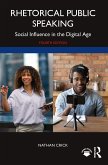Providing a comprehensive survey of the empirical research, theory, and history of public speaking, this handbook fills a crucial gap in public speaking pedagogy resources and provides a foundation for future research and pedagogical development.
Bringing together contributions from both up-and-coming and senior scholars in the field, this book offers a thorough examination of public speaking, guided by research across six key themes: the history of public speaking; the foundations of public speaking; issues of diversity, equity, and inclusion; considerations of public speaking across contexts; assessment of public speaking; and the future of public speaking in the twenty-first century. The evidence-based chapters engage with a broad discussion of public speaking through a variety of viewpoints to demonstrate how subtopics are connected and fraught with complexity. Contributors explore public speaking in education, business and professional settings, and political contexts, and outline how skills learned through public speaking are applicable to interpersonal, small group, and business interactions.
Reinforcing the relevance, importance, and significance of public speaking in individual, interpersonal, social, and cultural communication contexts, this accessibly written handbook will be an indispensable resource for public speaking instructors and program administrators. It will also be valuable reading for Communication Pedagogy and Introduction to Graduate Studies courses.
Bringing together contributions from both up-and-coming and senior scholars in the field, this book offers a thorough examination of public speaking, guided by research across six key themes: the history of public speaking; the foundations of public speaking; issues of diversity, equity, and inclusion; considerations of public speaking across contexts; assessment of public speaking; and the future of public speaking in the twenty-first century. The evidence-based chapters engage with a broad discussion of public speaking through a variety of viewpoints to demonstrate how subtopics are connected and fraught with complexity. Contributors explore public speaking in education, business and professional settings, and political contexts, and outline how skills learned through public speaking are applicable to interpersonal, small group, and business interactions.
Reinforcing the relevance, importance, and significance of public speaking in individual, interpersonal, social, and cultural communication contexts, this accessibly written handbook will be an indispensable resource for public speaking instructors and program administrators. It will also be valuable reading for Communication Pedagogy and Introduction to Graduate Studies courses.









